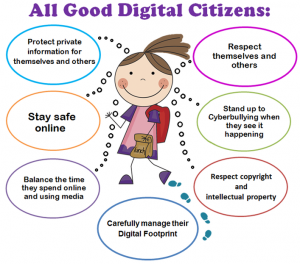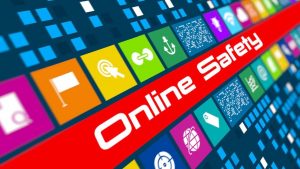What is Digital Citizenship?
Digital Citizenship refers to using technology responsibly by anyone who uses computers, the internet, and other digital devices to engage with people. A digital citizen a person who has skills and knowledge to effectively use the Internet and other forms technology responsibly. A digital citizen knows the difference between what is right and what is wrong behavior on the internet. Being a digital citizen includes: digital literacy, ethics, etiquette, online safety, norms, rights, and culture.

How to be a Good Digital Citizen:

Being a good digital citizen requires staying safe online, managing their digital footprint, respecting other people as well as themselves, standing up to cyber bullies, balancing the time they spend on and offline, protecting their private information, and respecting copyright and intellectual property. It is important to be a good digital citizen so it is a safer experience for everyone online.
Learn more about teaching digital resilience:
https://www.slideshare.net/MsCCostello/digital-citizenship-37029998
What is a Digital Footprint?
A digital footprint is the trail of data that you leave behind on the internet. The digital footprint includes the websites you visit, the emails that you send, and the information you provide to online services. A passive digital footprint is a data trail you unintentionally leave online and an active digital footprint is data that you purposefully submitted online. You can manage your digital footprint by taking precautions while online. You should be careful with what you share, where you share it, and who you share it with. You should also be mindful of the sites you visit, the emails you open, and the links that you click on. You should never share your password with anyone. You also shouldn’t share any personal information such as phone number, email, home address, your full name, or the school that you attend. You should also never share your location on the internet. Wait to post once you are home. You never want to allude to people that you are home alone or that your home is empty because you are posting while on vacation. Do not go to websites that you are not familiar with. Also, you never want to guess a websites URL and instead search for it using a search engine. Never open an attachment from an email that seems suspicious. Always check the person’s email address before opening the email to make sure it is someone that you know. Think twice before clicking on a link and make sure the web address is secure by starting with https. Google yourself to see what you can find from your digital footprint.
How you can manage your digital footprint:
https://www.rasmussen.edu/student-experience/college-life/what-is-digital-footprint/
Keeping a Good Digital Footprint as a Teacher:

It is important to keep a good image online for the teaching profession. You never know what student, teacher, parent, or faculty member is searching your name or coming across something of yours on the internet. Teachers have lost their jobs over things that they have posted on the internet. You are representing a school when you teach for them and if you are making yourself look bad on the internet, then you are also making that school look bad as well. You need to keep things professional online. If you want to post things that are personal but appropriate then it should be posted on a separate account than any professional account or page that you may have. I have learned how to keep my professional and personal life separate by having a Twitter account that is solely for ECI and all things teaching-related. You want to set the example for your students of how to be a good digital citizen.
Taking care of your digital footprint as a teacher:
https://www.teachhub.com/teachers-digital-identity
Online Child Safety Laws:
As a teacher or parent, you need to be aware of the laws that are in place to protect your child or student. Keeping your student safe is the number one priority. Knowing these laws will help protect your students identity and their privacy.
Children’s Online Privacy Protection Act (COPPA)- This law was put into place in 2000 and required websites to have parental permission until they are 13 years old to collect data or personal information from these children. The problem with this law is that children can put a different birthday to appear older and have access to certain sites. Children 14-17 are not protected under this law even though they are still minors. There is also no way to get verified parental consent over the internet.
Children’s Internet Protection Act (CIPA)- This law went into place in 2000 and it requires schools to have blocking or filtering technology on school computers/devices for student users. This also allows for teachers or parents to be able to block content so students aren’t able to view graphic or sexually explicit content. The problem with this law is that students can find ways to unblock content that they are trying to view.
Importance of Teaching Students Safety Online:

As a future teacher, learning about digital citizenship has been extremely beneficial to me. Some of the things that are considered dangerous to do online never occurred to me. There are so many aspects of being a good digital citizen. It is important to teach your students how to be good digital citizens to be able to keep them safe online. This is especially important if you are incorporating technology into the classroom such as internet use, using tablets/computers, or even using phones. You are responsible for your students when they are at school and that includes what they are browsing on the internet in the computer lab at school, what video they are watching on their tablet, etc. Digital citizenship is also important to teach them because there is so much cyber bullying that goes on currently. You should teach your students to respect their peers online the same way that they are expected to treat them at school and in the classroom.
Lesson Plans for Internet Safety:
http://https://www.commonsense.org/education/articles/23-great-lesson-plans-for-internet-safety
Internet Safety Interactive Websites:
Additional Resources for Online Safety:
https://www.pandasecurity.com/mediacenter/family-safety/internet-safety-for-kids/